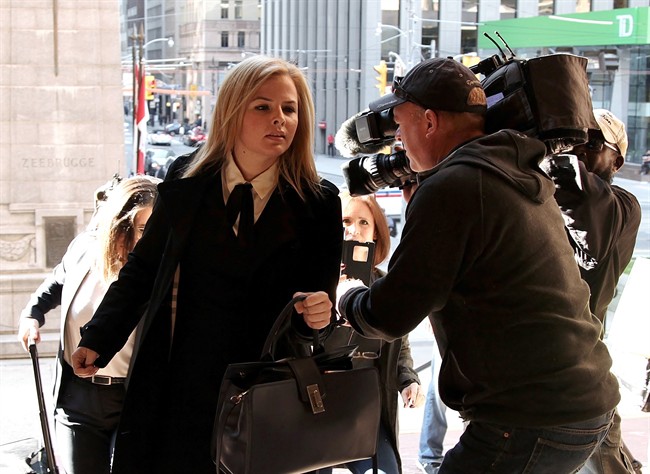TORONTO – The case against two former top political aides in Ontario accused of illegally destroying emails in the premier’s office took a serious blow Thursday when the judge ruled a key prosecution witness could not testify as an expert.

The witness, a former provincial police officer, was simply too close to investigators and the investigation known as Project Hampden to offer impartial evidence as legally required, Ontario court Judge Timothy Lipson ruled.
Lipson noted Robert (Bob) Gagnon, a retired police computer specialist, was integrally involved in investigating and prosecuting David Livingston and Laura Miller, even at one point suggesting one of the three charges laid against them. The pair has pleaded not guilty.
READ MORE: Defence attacks bias of key ‘expert’ Crown witness at Ontario gas plants trial
“There really was no separation between the work of Mr. Gagnon and that of the Project Hampden investigators,” Lipson said. “Over time, he became an important member of the Project Hampden team.”
The prosecution had wanted Gagnon to testify as an expert witness against Livingston and Miller, chief of staff and deputy to former Liberal premier Dalton McGuinty. As an expert, he could have offered the court his opinion on what he discovered.
But the defence said he didn’t meet the test of independence, impartiality and freedom from bias. It cited his extensive involvement in the probe virtually from the start, when investigators set him up with a separate computer forensics laboratory at provincial police headquarters.
The separate facility, Lipson said, was an appropriate step, but turned out to be the “only one.” Gagnon’s involvement “expanded rapidly over time” to the point where he became an important resource for the investigative team, the judge said.

His lack of independence and impartiality, the judge said, was thrown into stark relief in an email to his colleagues in February 2015, when he suggested laying a mischief charge against the accused.
“Livingston was leaving public service but had to protect his reputation and that of the party for any future employment elsewhere and the parties (sic) future election,” Gagnon wrote in the email. “Based on the above, an additional charge of mischief in relation to data would meet the test.”

Get breaking National news
Lipson noted the law on expert evidence has seen a “dramatic evolution” since a Supreme Court of Canada ruling in 2015. The courts, he said, have come to recognize the potential for “egregious miscarriages of justice” based on faulty expert witness testimony.
In particular, the judge said, expert police witnesses attract heightened scrutiny about their independence, and Gagnon, although officially retired since 2009, was essentially acting as a police officer during the investigation.
READ MORE: Defence attacks bias of key ‘expert’ Crown witness at Ontario gas plants trial
While he said he had no doubt about Gagnon’s sincerity or good intentions, his long, ongoing involvement – taking part in numerous case conferences with officers and prosecutors and providing legal and strategic advice – simply raised too many concerns about his impartiality.
“I agree with the defence submission that the evidence shows Mr. Gagnon has conflated the roles of expert and investigator,” Lipson said in a ruling that ran to 16 pages and took an hour to read.
Following his ruling, Lipson called a break to allow the two sides time to consider next steps. Prosecution lawyer Tom Lemon told Lipson it was too soon to determine the impact of the Gagnon ruling, but said he planned to start with another witness.
Fri, Sep 22: Two senior aides to former Premier Dalton McGuinty are accused of acting illegally in the deletion of computer hard drives. Alan Carter has more.

Lemon had previously told court there would be unspecified “consequences” if Gagnon was excluded as an expert.
Later Thursday, Linda Jackson, retired chief administrative officer for cabinet office, testified how Livingston, as he prepared to leave the premier’s office in late January 2013, requested administrative computer rights for one of his employees. Such rights would essentially give a person free run of a computer.
A month earlier, cabinet office decided individual email accounts in the premier’s office would be frozen rather than deleted after the person departed given numerous pending access requests for information in the two offices.
Livingston and Miller are accused of destroying emails related to the politically explosive cancellation of two gas plants near Toronto before the 2011 provincial election. Both had previously pleaded not guilty to the three charges they face: breach of trust, unlawful use of a computer, and mischief.







Comments
Want to discuss? Please read our Commenting Policy first.